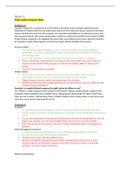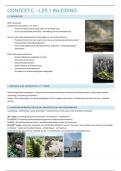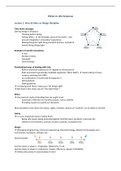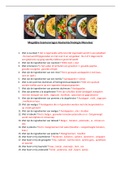Theory of flight
Book 1
- Genealogy (part 1)
- History (part 2)
- The present (part 3),
- Teleology (part 4)
- Epidemiology – love in the time of HIV (part 5)
Book 2
- Epistemology (part 1)
- Revelations (part 2)
- “Quotes” in italics and underlined
- Important events
- Characters
- Bold and black is important
- Symbols
Book summary
The Theory of Flight is a narrative, and a skilfully structured novel. The author is Zimbabwean
by birth. While Zimbabwe and various watershed moments of its colonial and mostly
postcolonial history are explored in the novel, these occurrences are not named, so that the
novel can work simultaneously on any level and as a powerful reminder of state oppression and
individual acts of either resistance or compliance in this country’s history. The title of the novel is
also that of a sculpture in three pieces featured late in the novel; possibly, the phrase
indicates that human beings who tend to take themselves as earthbound and limited
creatures need the reminder which some inspirational people and acts embody, that the
imagination can fly far beyond the restrictions of an individual’s or a people’s
circumstances. In her brief prologue, the narrator mentions the “ways of living, remembering,
seeing, knowing and dying” that bring about the existence of the novel’s central character,
Imogen Zula Nyoni (known to most as Genie), describing her life as “a culmination of
genealogies, histories, teleologies, epistemologies and epidemiologies”
Book summary
Ndlovu’s novel is not a simple, chronologically narrated tale. The sections are of uneven length,
and contain brief chapters, most of which are the names of the novel’s large list of characters.
The narrative density of the work results largely from the way the numerous characters’
lives are mapped out and interrelated, providing a broad, varied and carefully balanced
spectrum of lives
Because the narrator introduces the many characters of her narrative one by one, and because
she has, in addition, placed a list of characters (with brief descriptions of their identities and
social roles) at the beginning of the text, attentive readers will not have problems following the
various complex intertwining of these lives. Even relatively minor characters are evoked vividly
,and in detail, such as the colonial founder of the rural settlement where (apart from Bulawayo)
much of the action is set.
Book I’s part 1 has only one chapter, titled “Genesis”. The first “beginning” mentioned here
is Genie’s, naturally; it is described as being “like all our beginnings – beautiful and
golden”, though the miraculous nature of (her) birth is evoked in a magically enhanced manner,
for she emerges from her mother’s body as a “shiny golden egg” which takes some years to
hatch. Imogen Zula Nyoni is the daughter of Elizabeth Nyoni and Golide Gumede. While
Elizabeth is a country-and-western singer who dresses in rainbow-coloured outfits and wears a
blonde wig described as “golden” to underline her aspiration to follow in the steps of Dolly
Parton and make her name in Nashville, USA, Golide Gumede is a natural leader who from
childhood has been fascinated by aeroplanes; he was sent to the USSR to study
aeronautical engineering, and returned to fight bravely and to acclaim in the Zimbabwean
liberation war. Genie’s conception is the result of instant, fated attraction and enduring love and
loyalty between her parents, who are initially able to spend only nine hours together before
Golide rejoins the liberation forces and Elizabeth goes to make a home for them in Golide’s
ancestral village on Beauford Estate. They see their respective dreams – his of building an
aeroplane and Elizabeth’s of being taken to Nashville, Tennessee – as quite compatible,
for Golide intends building the flying machine that will transport them across the
Atlantic.
Ndlovu’s novel is very matter-of-fact about the British colonial occupation practices in southern
Africa, in that it manifests no intense resentment about the settler presence in the area. It is, for
example, quite casually mentioned that Golide’s father Baines, was taught to read and write by
the bored owner of “Ezulweni Estate”, and, in his early adulthood, he worked to charm poor
black country women into buying the Western fripperies he peddled for his employer, a Greek
travelling salesman. As he was an adventurous young man, the work brought him his lifelong
love of travel and his initial encounter with Prudence Ngoma, whom he loved and married, and
with whom he had Golide and his younger sister, Minenhle. Unfortunately, Baines was such an
inveterate traveller that, when he discovered that his little son was an albino and therefore
unable to travel in the open-topped vehicle Baines had acquired to take his family with him as
he moved, he sent his pregnant wife and son back to the village. Although Baines faithfully sent
family support home, Prudence turned against him for not appreciating their son’s beauty,
and decided that she would bring up her children as a single mother with the one ideal of
building character (which she did most successfully). The narrator praises Prudence for her
“sage and sanguine tutelage” for both children turning into brave and principled adults.
While still participating in the liberation war after his initial encounter with Elizabeth, Golide (a
war name which he retains all his life) decides that the flying machine he is going to build
for Elizabeth will be a giant pair of silver wings. Not only will this get her to Nashville, but it
will also demonstrate that African people can innovate, show enterprise and match engineering
skills and creative imagination. To begin with, he decides, he will shoot down the aeroplane
– a Vickers Viscount – that regularly flies across the Zambezi near the Victoria Falls so that he
has a model to work from. As he awaits this flight, Golide witnesses an inspirational event
, EXTREMELY IMPORTANT
“A herd of elephants raising dust beautifully in the savannah sunlight. The bull at the head of the
herd raised his trunk and trumpeted terrifically and all the elephants came to a gradual standstill
on one side of the Victoria Falls. The bull dived in close to where the waters plunge over the
edge and swam across the Zambezi River. The ancient river and the mighty animal were in
perfect harmony. This was a rite of passage made sacred by its sheer audacity. There was a
wonder to it all ... the possibility of the seemingly impossible. There was a feeling that Golide
got ... a knowing .... He became aware of his place in the world. He understood that in the
grander scheme of things he was but a speck ... a tiny speck ... and that was enough. There
was freedom, beauty even, in that kind of knowledge. It was the kind of knowledge that finally
quieted you. It was the kind of knowledge that allowed you to fly”
This passage recurs, or is alluded to, at key moments in the novel, signals its particular
significance to this narrative. It is an image representing the transcending of imagined
boundaries of what is achievable. Unfortunately, the shooting down of the Vickers Viscount
aeroplane by Golide Gumede – a similarly impressive achievement in the view of the
liberation war fighters – has (unlike the bull elephant’s triumphant swim across the mighty
river) an immediate, obviously destructive effect, with dangerous repercussions for Golide,
his loved ones and his village associates. These consequences are that the colonial and settler
authorities hunt him down and make him pay for the destruction. When the racist head of the
colonial state’s security agency is succeeded by the unnamed figure referred to throughout the
novel as “The Man Himself”. The only description about his appearance is that he is grossly
obese, that overflows his chair when he is seated. In clear contrast to all those whose thoughts
and dreams can take flight. In these respects, The Man Himself as head of state is, of course,
also a symbolic figure representing the self- and power-obsessed meanness and
viciousness of people who believe control over masses of people is all that matters, being the
only “value” they are able to perceive in existence. The operation — gukurahundi and was
executed by the army’s notorious “5th Brigade” – trained in violent techniques of state terrorism
to squash political recalcitrance in North Korea. These events led to the deaths of 20-30
thousand Ndebele people; the massacres and the torture and rape of civilians was an attempted
genocide. Ndlovu never directly names these events, but she does demonstrate how they
played out in Golide’s village late during this state-ordained period of ethnic persecution
by especially brutal military personnel.
Genie’s state of health and her spirited, courageous and morally imaginative response to
the way in which the above-mentioned events affect her, form the core of Ndlovu’s
narrative. As the prologue and first chapter indicate, her personal fate is affected by and
involves many others – Genie's life is clearly the focus and centre of the author’s vision.
Bennington Beauford, a settler, is much less vicious than many others, he employs the
villagers as the workforce on his farm, builds them strong, small and ugly homes and
establishes a school on the estate for the village children. His only child is his daughter, the
heir Beatrice Beit-Beauford, who would be described as a dangerous radical by the vast
majority of settlers when she establishes a multiracial artists’ commune on the estate, and bears
Book 1
- Genealogy (part 1)
- History (part 2)
- The present (part 3),
- Teleology (part 4)
- Epidemiology – love in the time of HIV (part 5)
Book 2
- Epistemology (part 1)
- Revelations (part 2)
- “Quotes” in italics and underlined
- Important events
- Characters
- Bold and black is important
- Symbols
Book summary
The Theory of Flight is a narrative, and a skilfully structured novel. The author is Zimbabwean
by birth. While Zimbabwe and various watershed moments of its colonial and mostly
postcolonial history are explored in the novel, these occurrences are not named, so that the
novel can work simultaneously on any level and as a powerful reminder of state oppression and
individual acts of either resistance or compliance in this country’s history. The title of the novel is
also that of a sculpture in three pieces featured late in the novel; possibly, the phrase
indicates that human beings who tend to take themselves as earthbound and limited
creatures need the reminder which some inspirational people and acts embody, that the
imagination can fly far beyond the restrictions of an individual’s or a people’s
circumstances. In her brief prologue, the narrator mentions the “ways of living, remembering,
seeing, knowing and dying” that bring about the existence of the novel’s central character,
Imogen Zula Nyoni (known to most as Genie), describing her life as “a culmination of
genealogies, histories, teleologies, epistemologies and epidemiologies”
Book summary
Ndlovu’s novel is not a simple, chronologically narrated tale. The sections are of uneven length,
and contain brief chapters, most of which are the names of the novel’s large list of characters.
The narrative density of the work results largely from the way the numerous characters’
lives are mapped out and interrelated, providing a broad, varied and carefully balanced
spectrum of lives
Because the narrator introduces the many characters of her narrative one by one, and because
she has, in addition, placed a list of characters (with brief descriptions of their identities and
social roles) at the beginning of the text, attentive readers will not have problems following the
various complex intertwining of these lives. Even relatively minor characters are evoked vividly
,and in detail, such as the colonial founder of the rural settlement where (apart from Bulawayo)
much of the action is set.
Book I’s part 1 has only one chapter, titled “Genesis”. The first “beginning” mentioned here
is Genie’s, naturally; it is described as being “like all our beginnings – beautiful and
golden”, though the miraculous nature of (her) birth is evoked in a magically enhanced manner,
for she emerges from her mother’s body as a “shiny golden egg” which takes some years to
hatch. Imogen Zula Nyoni is the daughter of Elizabeth Nyoni and Golide Gumede. While
Elizabeth is a country-and-western singer who dresses in rainbow-coloured outfits and wears a
blonde wig described as “golden” to underline her aspiration to follow in the steps of Dolly
Parton and make her name in Nashville, USA, Golide Gumede is a natural leader who from
childhood has been fascinated by aeroplanes; he was sent to the USSR to study
aeronautical engineering, and returned to fight bravely and to acclaim in the Zimbabwean
liberation war. Genie’s conception is the result of instant, fated attraction and enduring love and
loyalty between her parents, who are initially able to spend only nine hours together before
Golide rejoins the liberation forces and Elizabeth goes to make a home for them in Golide’s
ancestral village on Beauford Estate. They see their respective dreams – his of building an
aeroplane and Elizabeth’s of being taken to Nashville, Tennessee – as quite compatible,
for Golide intends building the flying machine that will transport them across the
Atlantic.
Ndlovu’s novel is very matter-of-fact about the British colonial occupation practices in southern
Africa, in that it manifests no intense resentment about the settler presence in the area. It is, for
example, quite casually mentioned that Golide’s father Baines, was taught to read and write by
the bored owner of “Ezulweni Estate”, and, in his early adulthood, he worked to charm poor
black country women into buying the Western fripperies he peddled for his employer, a Greek
travelling salesman. As he was an adventurous young man, the work brought him his lifelong
love of travel and his initial encounter with Prudence Ngoma, whom he loved and married, and
with whom he had Golide and his younger sister, Minenhle. Unfortunately, Baines was such an
inveterate traveller that, when he discovered that his little son was an albino and therefore
unable to travel in the open-topped vehicle Baines had acquired to take his family with him as
he moved, he sent his pregnant wife and son back to the village. Although Baines faithfully sent
family support home, Prudence turned against him for not appreciating their son’s beauty,
and decided that she would bring up her children as a single mother with the one ideal of
building character (which she did most successfully). The narrator praises Prudence for her
“sage and sanguine tutelage” for both children turning into brave and principled adults.
While still participating in the liberation war after his initial encounter with Elizabeth, Golide (a
war name which he retains all his life) decides that the flying machine he is going to build
for Elizabeth will be a giant pair of silver wings. Not only will this get her to Nashville, but it
will also demonstrate that African people can innovate, show enterprise and match engineering
skills and creative imagination. To begin with, he decides, he will shoot down the aeroplane
– a Vickers Viscount – that regularly flies across the Zambezi near the Victoria Falls so that he
has a model to work from. As he awaits this flight, Golide witnesses an inspirational event
, EXTREMELY IMPORTANT
“A herd of elephants raising dust beautifully in the savannah sunlight. The bull at the head of the
herd raised his trunk and trumpeted terrifically and all the elephants came to a gradual standstill
on one side of the Victoria Falls. The bull dived in close to where the waters plunge over the
edge and swam across the Zambezi River. The ancient river and the mighty animal were in
perfect harmony. This was a rite of passage made sacred by its sheer audacity. There was a
wonder to it all ... the possibility of the seemingly impossible. There was a feeling that Golide
got ... a knowing .... He became aware of his place in the world. He understood that in the
grander scheme of things he was but a speck ... a tiny speck ... and that was enough. There
was freedom, beauty even, in that kind of knowledge. It was the kind of knowledge that finally
quieted you. It was the kind of knowledge that allowed you to fly”
This passage recurs, or is alluded to, at key moments in the novel, signals its particular
significance to this narrative. It is an image representing the transcending of imagined
boundaries of what is achievable. Unfortunately, the shooting down of the Vickers Viscount
aeroplane by Golide Gumede – a similarly impressive achievement in the view of the
liberation war fighters – has (unlike the bull elephant’s triumphant swim across the mighty
river) an immediate, obviously destructive effect, with dangerous repercussions for Golide,
his loved ones and his village associates. These consequences are that the colonial and settler
authorities hunt him down and make him pay for the destruction. When the racist head of the
colonial state’s security agency is succeeded by the unnamed figure referred to throughout the
novel as “The Man Himself”. The only description about his appearance is that he is grossly
obese, that overflows his chair when he is seated. In clear contrast to all those whose thoughts
and dreams can take flight. In these respects, The Man Himself as head of state is, of course,
also a symbolic figure representing the self- and power-obsessed meanness and
viciousness of people who believe control over masses of people is all that matters, being the
only “value” they are able to perceive in existence. The operation — gukurahundi and was
executed by the army’s notorious “5th Brigade” – trained in violent techniques of state terrorism
to squash political recalcitrance in North Korea. These events led to the deaths of 20-30
thousand Ndebele people; the massacres and the torture and rape of civilians was an attempted
genocide. Ndlovu never directly names these events, but she does demonstrate how they
played out in Golide’s village late during this state-ordained period of ethnic persecution
by especially brutal military personnel.
Genie’s state of health and her spirited, courageous and morally imaginative response to
the way in which the above-mentioned events affect her, form the core of Ndlovu’s
narrative. As the prologue and first chapter indicate, her personal fate is affected by and
involves many others – Genie's life is clearly the focus and centre of the author’s vision.
Bennington Beauford, a settler, is much less vicious than many others, he employs the
villagers as the workforce on his farm, builds them strong, small and ugly homes and
establishes a school on the estate for the village children. His only child is his daughter, the
heir Beatrice Beit-Beauford, who would be described as a dangerous radical by the vast
majority of settlers when she establishes a multiracial artists’ commune on the estate, and bears










